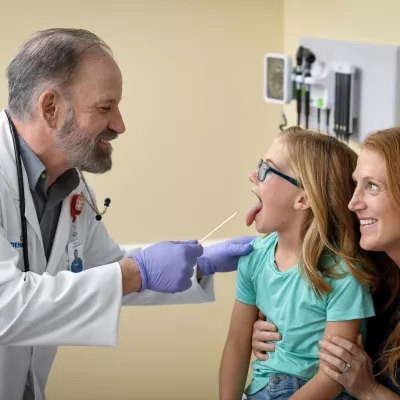
Centra Care Lab Testing
For more than 40 years, AdventHealth Centra Care has been your trusted urgent care provider, serving you and your whole family when you need us most.
As part of our commitment to provide comprehensive, efficient health care, we offer onsite lab testing services at our Centra Care clinics*. Onsite lab testing services make getting the care you need when you need it easier. We’re honored to help our communities feel whole.
*Not all lab tests may be available onsite, and any lab testing first requires an evaluation by a Centra Care provider.
Centra Care Lab Testing Services
-
Lab Testing Services
We’re about making life simpler — giving you the convenience of important diagnostic services without the extra step of making an appointment. Following a provider evaluation, lab testing should be a straightforward experience, and Centra Care can help you get the care you need.
-
Streamlined Patient Care
Onsite lab testing allows us to provide a more seamless and integrated approach to your urgent care visit. Results are readily available to your health care providers, making it faster and easier for them to adjust treatment plans or interventions.
-
Lab Results Review
Reviewing your lab tests with your provider is hassle-free and supportive. You and your provider will go over your results together, ensuring you understand what the tests show and all the details.

Find Lab Testing Near You
We’re open seven days a week, so you can get the lab tests you need on your schedule following an exam with one of our providers. With locations in Central Florida, Tampa, Kansas and North Carolina, you’ll find a Centra Care urgent care location with lab testing services close to home*.
*Not all lab tests may be available onsite, and any lab testing first requires an evaluation by a Centra Care provider.
Our Other Centra Care Services
-
Flu Tests
When you’re experiencing flu symptoms, get tested as soon as possible. Early testing and treatment are key to a speedier recovery. If you have the flu, our health care team will find the treatment right for you.
-
Physical Exams
Physicals are not just about checking your blood pressure, height and weight. They’re a head-to-toe look at your whole health and a great time to speak with your provider about any questions or concerns.
-
Strep Tests
Testing for strep throat helps your health care provider determine if your sore throat is streptococcus or just the common cold. A simple throat swab, and you're done. Testing ensures you're not sidelined for long, so you can get back to conquering the day.
Lab Testing FAQs
-
Q:Question: What are the most common lab tests?
A:Answer:We offer some of the most common lab tests, identifying a range of health indicators and conditions, including:
- Urinalysis — Examines urine for signs of kidney disease, diabetes, urinary tract infections and other conditions. It includes assessments of color, clarity, protein, glucose and other components.
Continue ReadingCollapse Answer- Flu Test — Used to diagnose influenza, commonly known as the flu. It helps identify whether a person's symptoms, like fever, cough, sore throat, body aches or fatigue, are due to the influenza virus.
- Mononucleosis Test — Diagnoses mononucleosis, often referred to as mono. Mono is typically caused by the Epstein-Barr virus (EBV) with symptoms like sore throat, fever, swollen lymph nodes and fatigue.
- Bacterial Vaginosis (BV) Test — Specifically diagnoses BV, a common infection caused by an imbalance of bacteria in the vagina. Symptoms may include unusual vaginal discharge, odor, itching or irritation.
- Trichomoniasis Test — Diagnoses trichomoniasis, a sexually transmitted infection (STI) caused by the parasite Trichomonas vaginalis. Symptoms in women may include itching, burning, redness or soreness of the genitals, as well as abnormal vaginal discharge.
- Strep Test — Diagnoses streptococcal pharyngitis, commonly known as strep throat. Strep throat is caused by the Streptococcus bacteria and presents symptoms such as sore throat, fever, swollen tonsils and difficulty swallowing.
- COVID Test — Detects the presence of the SARS-CoV-2 virus, which causes COVID-19. It identifies whether a person has an active infection, regardless of symptoms. Testing is crucial for controlling the virus's spread and guiding appropriate medical care and public health measures.
- Rapid Tests — We offer rapid tests with results in as little as 15 to 30 minutes for multiple illnesses, including COVID-19, influenza and strep throat.
The need for specific testing may vary based on an individual's health concerns, symptoms or risk factors. Our providers may order additional specialized tests based on medical history and clinical presentation. Always consult your health care professional for personalized advice and interpretation of lab results.
-
Q:Question: What’s the difference between a diagnostic test and a lab test?
A:Answer:All lab tests are diagnostic tests, but not all diagnostic tests are necessarily lab tests. Diagnostic tests encompass a broader spectrum of assessments, including clinical evaluations, imaging studies and laboratory analyses. Lab tests are a subset of diagnostic tests that examine samples in a controlled laboratory environment.
Continue ReadingCollapse AnswerFor example, if a health care provider orders a blood test (lab test) to check cholesterol levels, the goal is to diagnose or assess the risk of cardiovascular disease (diagnostic test). Therefore, while diagnostic tests can involve various methods and procedures, lab tests specifically pertain to analyses conducted in a laboratory.
-
Q:Question: How much do lab tests cost?
A:Answer:The cost of lab tests can vary based on factors like the specific test or panel ordered, the laboratory performing the test, geographic location and whether insurance coverage is involved.
Here are some general considerations:
- Type of Test — Basic lab tests, such as a complete blood count (CBC) or a basic metabolic panel (BMP), are generally less expensive than more specialized or complex tests. Advanced tests, genetic testing, and specialized panels may be more costly.
Continue ReadingCollapse Answer- Laboratory Fees — Different laboratories may charge different fees for the same test. The choice of laboratory can impact the overall cost.
- Insurance Coverage — If you have health insurance, the cost of lab tests may be partially or fully covered, depending on your plan. Check with your insurance provider to understand your coverage, including any copays or deductibles.
- Out-of-Pocket Costs — For individuals without insurance or for tests not covered by insurance, out-of-pocket costs vary. Some labs offer cash prices or discounted rates for self-pay patients.
- Location — Geographic location influences the cost of lab tests. Prices may vary between different regions and even within the same city.
- Complexity of Testing — Highly specialized or complex tests, such as genetic testing or molecular diagnostics, often come with higher costs than routine blood tests.
It's important to note that lab test costs can be challenging to predict without specific details about the test and the individual's insurance coverage. Before getting a lab test, check with your provider to understand why the test is being ordered and if alternative, more cost-effective options exist. You should also verify your insurance coverage and understand any possible out-of-pocket costs. Thirdly, ask your provider which laboratory will be used and if there are cash prices or discounts for self-pay patients.
-
Q:Question: How long do lab results take?
A:Answer:The turnaround time for lab results varies depending on the type of test, the laboratory's workload, the complexity of the analysis and the location.
Here are some general guidelines:
- Routine Blood Tests — Common tests like a complete blood count (CBC) or basic metabolic panel (BMP) typically have a relatively quick turnaround. Results are often available within a day or two.
Continue ReadingCollapse Answer- Specialized or Complex Tests — Tests involving more complex analyses, such as genetic testing or molecular diagnostics, may take longer. These tests could have a turnaround time ranging from a few days to several weeks.
- Urgent or Critical Tests — Some tests are prioritized based on medical necessity. Urgent or critical results may be processed more quickly, and health care providers may receive them within hours.
It's important to note that while some results may be available quickly, others may take more time for a thorough analysis. Additionally, unexpected factors such as the need for repeat testing or quality control issues can contribute to delays.
-
Q:Question: What are the benefits of getting the right lab tests?
A:Answer:Getting the right lab tests, ranging from routine screenings to specialized diagnostics, is pivotal in early disease detection, allowing your providers to intervene before symptoms arise. This proactive approach helps us provide personalized treatment plans. Accurate lab results enable health care professionals to tailor interventions to your needs.
Getting the right lab tests confirms or rules out diagnosis, monitors chronic conditions and screens for risk factors.
Schedule Your Lab Tests Today
We are happy to provide lab testing services at all of our Centra Care locations, but if you want faster service, make a reservation with one of our walk-in clinics for onsite lab services*.
*Not all lab tests may be available onsite, and any lab testing first requires an evaluation by a Centra Care provider.





